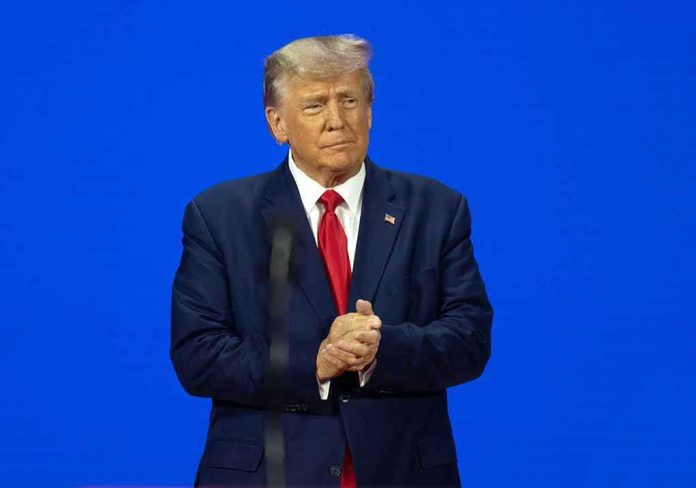
Trump’s dramatic reversal on Ukraine policy signals a new era for U.S. foreign strategy, igniting debate over America’s role and the fallout for global security.
Story Highlights
- President Trump now publicly backs Ukraine’s full reclamation of lost territory, including Crimea.
- This marks a major break from previous U.S. caution and Trump’s earlier calls for Ukrainian concessions.
- Trump cites Russia’s economic weaknesses and strong Western support as reasons for his shift.
- The policy change follows a failed Alaska Summit and rising pressure for decisive U.S. leadership.
Trump’s Shift: From Caution to Full-Throated Support for Ukraine
On September 23, 2025, during the United Nations General Assembly in New York, President Donald Trump announced that Ukraine can reclaim all territory lost to Russia, including Crimea. This bold declaration comes after his meeting with Ukrainian President Volodymyr Zelensky and marks a dramatic reversal from Trump’s prior advocacy for Ukrainian concessions to achieve peace. The timing follows the Alaska Summit, a failed diplomatic effort that left Western leaders searching for a new approach. Trump’s rhetoric now frames Russia as both economically and militarily vulnerable, suggesting that Ukraine—with continued Western backing—has the means to restore its original borders.
Backdrop: Decades of Conflict and Shifting U.S. Policy
The Russia-Ukraine conflict traces back to Russia’s annexation of Crimea in 2014, a move that set off years of war and shifting frontlines. Western nations, including the United States and European Union, have supplied Ukraine with extensive military and financial aid. Yet, the question of whether Ukraine could ever reclaim Crimea and other occupied regions has divided policymakers for years. Trump’s earlier stance, like that of previous U.S. administrations, leaned toward caution, urging compromise for the sake of peace. His new position—publicly supporting Ukraine’s full territorial restoration—breaks with years of U.S. diplomatic ambiguity and signals a significant change in Western resolve.
Key Stakeholders: Motivations and Power Dynamics
Trump’s announcement reshapes the landscape for several major players. President Zelensky, seeking to restore Ukraine’s sovereignty, welcomes the promise of ongoing Western support. The European Union and NATO, already committed to Ukraine’s defense, face mounting pressure to deliver more aid and maintain unity. Russia, under President Putin, confronts deep economic strain and battlefield setbacks as described by Trump. Meanwhile, Congress and key European heads of state will weigh in on authorizing additional support and shaping long-term strategy. The United States and its allies hold substantial leverage through sanctions and military assistance, while Ukraine remains heavily dependent on this backing for its continued resistance.
Implications: Opportunities and Risks for the U.S. and Allies
In the short term, Trump’s declaration is likely to boost Ukrainian morale and strengthen their negotiating position. However, the shift could provoke heightened rhetoric or military escalation from Moscow. Western powers must now contend with the challenge of balancing support for Ukraine with the risk of a broader conflict. Economically, Russia faces increasing pressure, but the cost of sustaining military aid remains high for Western nations. Politically, the move may reinforce alliance cohesion among NATO members and deter further Russian aggression. Conversely, critics warn the policy could reduce diplomatic flexibility, making a peaceful resolution more difficult to achieve.
In Massive Foreign Policy Shift, Trump Says Ukraine Can Take Back Lost Territory https://t.co/19EFlmYXuK
— ConservativeLibrarian (@ConserLibrarian) September 23, 2025
Expert Analysis: Strategic Gains and Lingering Challenges
Policy analysts and security experts note that Trump’s shift could embolden Ukrainian forces and solidify Western resolve against Russian expansion. Political scientists emphasize the significance of strong U.S. leadership in shaping the trajectory of the conflict and the broader balance of power in Europe. Economists highlight Russia’s economic vulnerabilities but caution that sanctions alone have not yet forced a Russian withdrawal. While supporters believe this aggressive stance might accelerate Ukraine’s victory, others argue it risks escalating hostilities and prolonging the war. Ultimately, the practical feasibility of Ukraine reclaiming all occupied territory, especially Crimea, remains uncertain and will depend on both military realities and diplomatic maneuvering.
Sources:
Trump says Ukraine can take back all lost territory
The latest: Trump says he now believes Ukraine can take back all of its land after Zelenskyy meeting
Trump says Ukraine can win back original territory
Ukraine can win back all territory lost to Russia, Trump says







